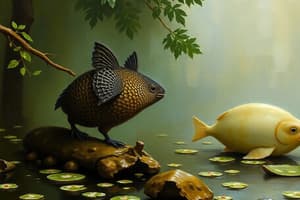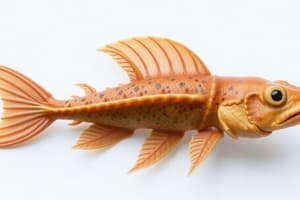Podcast
Questions and Answers
What does Urochordata mean?
What does Urochordata mean?
- Free-living larva
- Colonial forms
- Tail backstring (correct)
- Sea squirts
Recent discovery of ________ in Urochordata, which makes it have a closer common ancestor than Cephalochordata.
Recent discovery of ________ in Urochordata, which makes it have a closer common ancestor than Cephalochordata.
Neural crest cells
(Recent discovery of neural crest cells in Urochordata) _______ previously was thought to be unique to vertebrates.
(Recent discovery of neural crest cells in Urochordata) _______ previously was thought to be unique to vertebrates.
Neural crest
(Recent discovery of neural crest cells in Urochordata) Neural crest cells emerge from a.)__ in Urochordates, similar to what happens in the b.).
(Recent discovery of neural crest cells in Urochordata) Neural crest cells emerge from a.)__ in Urochordates, similar to what happens in the b.).
(Recent discovery of neural crest cells in Urochordata) The neural crest cells migrate to a.)__ and form b.) (only derivatives known so far).
(Recent discovery of neural crest cells in Urochordata) The neural crest cells migrate to a.)__ and form b.) (only derivatives known so far).
(Recent discovery of neural crest cells in Urochordata) Presence of a.)___ & b.)_ now places c.)__ most closely related to __d.)____.
(Recent discovery of neural crest cells in Urochordata) Presence of a.)___ & b.)_ now places c.)__ most closely related to __d.)____.
What type of reproduction do colonial forms of Urochordata exhibit?
What type of reproduction do colonial forms of Urochordata exhibit?
Larva are ____a.)__, sexually b.) form, that is c.) distinct from the d.) stage, usually eats different food, and may even have e.) than adult.
Larva are ____a.)__, sexually b.) form, that is c.) distinct from the d.) stage, usually eats different food, and may even have e.) than adult.
What is the process called that transforms larva into adult Urochordates?
What is the process called that transforms larva into adult Urochordates?
In this stage, it only lasts a few hours to a few days at most.
In this stage, it only lasts a few hours to a few days at most.
During the time of larval metamorphosis, they feed.
During the time of larval metamorphosis, they feed.
Flexible outer body covering of acellular material (i.e. ECM) secreted by underlying epidermis is called ___.
Flexible outer body covering of acellular material (i.e. ECM) secreted by underlying epidermis is called ___.
Some a.)__ structures contained in b.)_ at anterior end of c.).--> light sensitive d.)_ -> gravity sensitive e.)_
Some a.)__ structures contained in b.)_ at anterior end of c.).--> light sensitive d.)_ -> gravity sensitive e.)_
What is the eye of Urochordate larvae called?
What is the eye of Urochordate larvae called?
What is the ear of Urochordate larvae called?
What is the ear of Urochordate larvae called?
The rudimentary a.)__ function as _b.)
The rudimentary a.)__ function as _b.)
Metamorphosis attached to substrate by _______.
Metamorphosis attached to substrate by _______.
a.)__ are surrounding the notochord which separate from one another and the notochord goes limp due to b.).
a.)__ are surrounding the notochord which separate from one another and the notochord goes limp due to b.).
The ___________ is drawn into the outer body and reabsorbed (loss of 3 of 5 chordate characteristics).
The ___________ is drawn into the outer body and reabsorbed (loss of 3 of 5 chordate characteristics).
What other structures are lost during metamorphosis?
What other structures are lost during metamorphosis?
a.) enlarges, number of Pharyngeal slits b.)_, and c.) begins.
a.) enlarges, number of Pharyngeal slits b.)_, and c.) begins.
a.)__ further subdivide into smaller openings called b.), resulting in a c.), known as a d.)_.
a.)__ further subdivide into smaller openings called b.), resulting in a c.), known as a d.)_.
Also, note ___________ of metamorphosis.
Also, note ___________ of metamorphosis.
As adults, they show ONLY a.)_, which is homologous to the b.)_ of vertebrates.
As adults, they show ONLY a.)_, which is homologous to the b.)_ of vertebrates.
List the criteria for adult's feeding.
List the criteria for adult's feeding.
Adult feeding has ___________ apparatus.
Adult feeding has ___________ apparatus.
Adult Urochordates have unidirectional flow of water.
Adult Urochordates have unidirectional flow of water.
Water drawn in by a.)_ through b.)_.
Water drawn in by a.)_ through b.)_.
Water flows into a.)__ and through b.).
Water flows into a.)__ and through b.).
a.) is produced by endostyles, which lines the b.)__ and c.)__.
a.) is produced by endostyles, which lines the b.)__ and c.)__.
Rows of a.) collect mucus, and sweep it to the b.).
Rows of a.) collect mucus, and sweep it to the b.).
Water enters the a.)_, which is the space between the basket and b.)___.
Water enters the a.)_, which is the space between the basket and b.)___.
Water exits via ___________.
Water exits via ___________.
Note that the adult is specialized for _______________, and that's about it.
Note that the adult is specialized for _______________, and that's about it.
They have a a.). There is a recent discovery of b.) and are c.) as adults.
They have a a.). There is a recent discovery of b.) and are c.) as adults.
Lacks a.). It has a b.), that they had and lost during c.).
Lacks a.). It has a b.), that they had and lost during c.).
They have a.)___ with b.)__ in between.
They have a.)___ with b.)__ in between.
The Endostyle is their __________.
The Endostyle is their __________.
They are a.)___ and they have a digestive system, which is their b.)____. They also have gonads.
They are a.)___ and they have a digestive system, which is their b.)____. They also have gonads.
As larvae, their tail is known as the a.)___ and they have b.)_ characteristics, but only have c.) as adults.
As larvae, their tail is known as the a.)___ and they have b.)_ characteristics, but only have c.) as adults.
Which stage are sessile and can go through both sexual and asexual reproduction?
Which stage are sessile and can go through both sexual and asexual reproduction?
In Asexual reproduction, this is mushy.
In Asexual reproduction, this is mushy.
During sexual reproduction, the offspring does a.)__, so they can get away from the family. This means they are b.). It can lasts hours, and/or days depending on c.).
During sexual reproduction, the offspring does a.)__, so they can get away from the family. This means they are b.). It can lasts hours, and/or days depending on c.).
In figure 2.25, the organism loses the a.)___ and b.)__ it. Some can reproduce without c.); genetically the 2 are d.)__.
In figure 2.25, the organism loses the a.)___ and b.)__ it. Some can reproduce without c.); genetically the 2 are d.)__.
In the Ascidian tadpole (larvae) known as a.)__ have b.) have structures.
In the Ascidian tadpole (larvae) known as a.)__ have b.) have structures.
These are the filtering baskets.
These are the filtering baskets.
a.) are the eyes, and b.)__ are for hearing and balance. The 2 together are for ____c.)_____.
a.) are the eyes, and b.)__ are for hearing and balance. The 2 together are for ____c.)_____.
What is used for digestion in Urochordates?
What is used for digestion in Urochordates?
From the neck and up, all of the structures are a.), and are lost during ____b.)____.
From the neck and up, all of the structures are a.), and are lost during ____b.)____.
Structures in the tail are __________.
Structures in the tail are __________.
This was originally ventral and has signified slits.
This was originally ventral and has signified slits.
What has an outflow and is homologous to the atrial pore?
What has an outflow and is homologous to the atrial pore?
In Figure 2.24, name the 3 elaborate structures.
In Figure 2.24, name the 3 elaborate structures.
Figure 2.24 has NO post-anal tail.
Figure 2.24 has NO post-anal tail.
The Endostyle makes a.); b.) is lined with mucus. c.) is lining the pharynx (swooping food into the mouth through d.)); pulls water in; water passes through e.)___- and it has f.) as well.
The Endostyle makes a.); b.) is lined with mucus. c.) is lining the pharynx (swooping food into the mouth through d.)); pulls water in; water passes through e.)___- and it has f.) as well.
In figure 2.23 it shows ______________.
In figure 2.23 it shows ______________.
Flashcards are hidden until you start studying
Study Notes
Urochordata Overview
- Urochordata translates to "tail backstring" and includes tunicates and sea squirts.
- Recent discoveries show that neural crest cells in Urochordata suggest a closer common ancestry with Vertebrates than previously thought.
Neural Crest Cells
- Neural crest was previously believed to be exclusive to Vertebrates but has been identified in Urochordata.
- These cells emerge from the neural tube in Urochordates, similar to vertebrate development.
- They migrate to the body wall and form pigment cells, which are key derivatives identified so far.
Reproductive Methods
- Class Ascidiacea (tunicates) can reproduce both asexually and sexually, especially in colonial forms.
Larval Characteristics
- Larvae are free-living, immature forms and are morphologically distinct from adult stages, often having different dietary needs and habitats.
- Metamorphosis transforms larvae into adult forms, only lasting a few hours to days.
- While larval fish possess all chordate features, the adult stage retains only two characteristics post-metamorphosis.
Metamorphosis Process
- In metamorphosis, the axial complex (notochord, dorsal nerve cord, tail muscles) is drawn back and reabsorbed, resulting in loss of some chordate characteristics.
- Pharyngeal slits increase in number and assist in active feeding.
Adult Characteristics
- Adults have an elaborate filtering basket homologous to vertebrate gill systems.
- Feeding involves a unidirectional flow of water facilitated by cilia, leading to effective particle trapping in mucus produced by the endostyle.
- Structures such as the pharyngeal slits and branchial basket continue to play critical roles in their feeding processes.
Biological Functions and Structures
- The endostyle functions as a subpharyngeal organ and is vital for digestion.
- Adults possess gonads and a developed gut, highlighting their sessile lifestyle.
- Key structures lost during metamorphosis include the dorsal axial, tail components, and certain sensory structures.
Adaptations and Evolution
- Adults of Urochordata are primarily specialized for feeding and reproduction, with a focus on filtration.
- Notable sensory structures include the ocellus (light-sensitive) and otolith (gravity-sensitive), which aid in navigation and balance.
Asexual and Sexual Reproduction
- In asexual reproduction, organisms may form stolons, while sexual offspring are mobile, ensuring dispersal away from the parent.
Anatomical Features
- They exhibit rudimentary cerebral and visceral ganglia that function as processing centers, indicating some developmental cephalization.
- The filtering system utilized by adults is composed of pharyngeal slits and bars which collaboratively create a branchial basket for effective feeding.
Larval Development
- Structures in the tail region are positioned posterior to the gut, indicating specialization for pre-adult aquatic life.
- As larvae, they initially exhibit all five chordate characteristics but lose most during transition to adulthood.
Additional Notes
- Metamorphosis marks a major developmental shift, involving physical changes and adaptations for a sessile, feeding lifestyle.
- While the larval and adult forms differ greatly, both share core themes of adaptation to environment and functionality, underscoring Urochordata’s evolutionary significance.
Studying That Suits You
Use AI to generate personalized quizzes and flashcards to suit your learning preferences.




